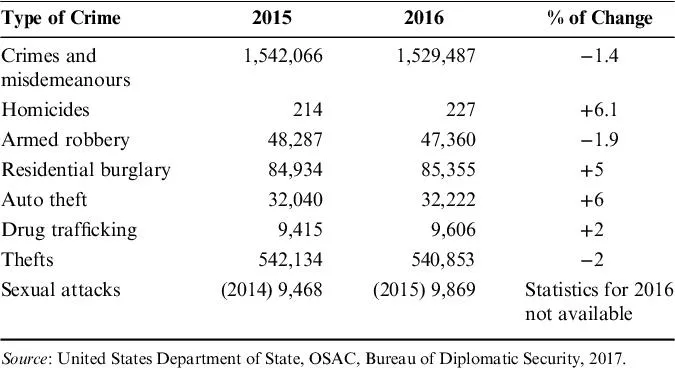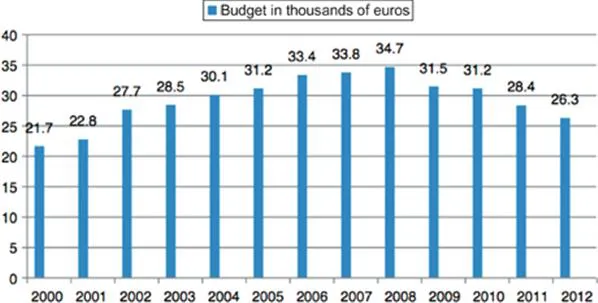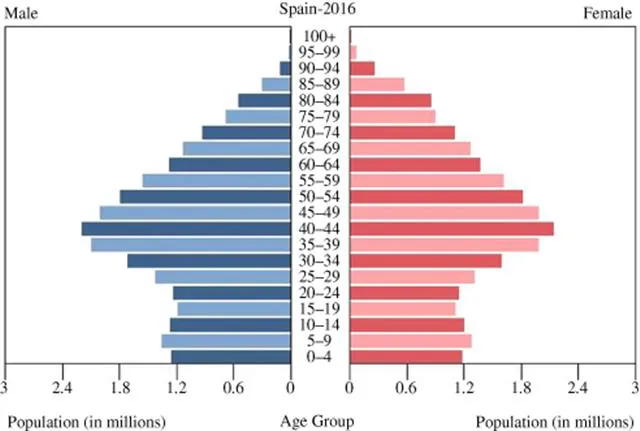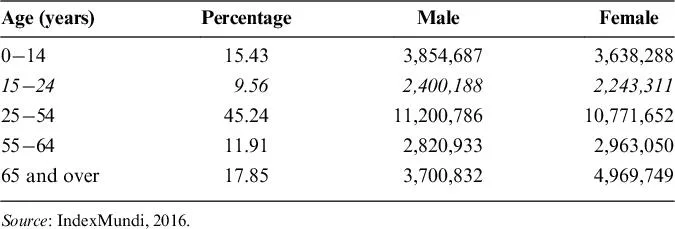
eBook - ePub
Generations Z in Europe
Inputs, Insights and Implications
- 346 pages
- English
- ePUB (mobile friendly)
- Available on iOS & Android
eBook - ePub
Generations Z in Europe
Inputs, Insights and Implications
About this book
Generations Z in Europe: Inputs, Insights and Implications brings together differing geographic perspectives from a range of researchers to present the complex picture of contemporary reality for 'Gen-Z' workers, demonstrating the diverse issues faced by the new global workforce.
Using a variety of perspectives from social science, media theory and literary studies, the book creates a showcase of existing and new theoretical and scientific approaches to exploring current challenges relating to Generation Z workers. The voices of theorists such as Karl Mannheim, Jean Baudrillard and Neil Postman are utilized to understand and reflect on the different social, cultural and political contexts for Generation Z in Europe and the need to sensitize organizations to the needs of these young future employees.
Chapters offer analysis exploring nine different national contexts from Spain, Great Britain, France, The Netherlands, Italy, Germany, Serbia, Bulgaria and Russia. Key themes highlighted across these studies include: digital socialization, intellectual capital, social engagement, aging organizations and the digital divide. The discussion of future implications and the conclusions offered make this book an illuminating read for both researchers and practitioners working within areas of Business and Human Resource Management.
Frequently asked questions
Yes, you can cancel anytime from the Subscription tab in your account settings on the Perlego website. Your subscription will stay active until the end of your current billing period. Learn how to cancel your subscription.
No, books cannot be downloaded as external files, such as PDFs, for use outside of Perlego. However, you can download books within the Perlego app for offline reading on mobile or tablet. Learn more here.
Perlego offers two plans: Essential and Complete
- Essential is ideal for learners and professionals who enjoy exploring a wide range of subjects. Access the Essential Library with 800,000+ trusted titles and best-sellers across business, personal growth, and the humanities. Includes unlimited reading time and Standard Read Aloud voice.
- Complete: Perfect for advanced learners and researchers needing full, unrestricted access. Unlock 1.4M+ books across hundreds of subjects, including academic and specialized titles. The Complete Plan also includes advanced features like Premium Read Aloud and Research Assistant.
We are an online textbook subscription service, where you can get access to an entire online library for less than the price of a single book per month. With over 1 million books across 1000+ topics, we’ve got you covered! Learn more here.
Look out for the read-aloud symbol on your next book to see if you can listen to it. The read-aloud tool reads text aloud for you, highlighting the text as it is being read. You can pause it, speed it up and slow it down. Learn more here.
Yes! You can use the Perlego app on both iOS or Android devices to read anytime, anywhere — even offline. Perfect for commutes or when you’re on the go.
Please note we cannot support devices running on iOS 13 and Android 7 or earlier. Learn more about using the app.
Please note we cannot support devices running on iOS 13 and Android 7 or earlier. Learn more about using the app.
Yes, you can access Generations Z in Europe by Christian Scholz, Anne Rennig, Christian Scholz,Anne Rennig in PDF and/or ePUB format, as well as other popular books in Business & Human Resource Management. We have over one million books available in our catalogue for you to explore.
Information
Generation Z in Spain: Digital Socialisation and Intellectual Capital
Abstract
Due to the recovery of the quality of life coming from a real estate boom and due to the extensive possibilities for leisure and work, the young generation in Spain looks with more optimism into the future as did generations before. Still, Spain is a nation with low employment prospects. This puts many professionals in a difficult position, having to sacrifice family relations for a better job. Another problem is the rate of university degrees, which is over the European average. Therefore, Generation Z has higher goals for their lives than previous generations. One of the traditional problems is that young people get high marks in their professional degrees but have a lack of employability skills and are therefore not always success in their first apprenticeship contract with companies. Generation Z has social skill problems with respect to empathy, communication and conflict management. Due to their digital style of life, they have substituted the gregarious relationships leisure for the bedroom culture of social networks.
Keywords: Digital socialisation; ICTs; social media; happy urban youngsters; Generation Z
- 1. Situation 62
- 1.1. History 62
- 1.2. Culture 62
- 1.3. Demographics 65
- 1.4. Economic Situation 66
- 1.5. Education 70
- 1.6. Political System 74
- 1.7. Conflicts and Tensions 75
- 2. Drivers 75
- 2.1. Technologies 75
- 2.2. Media 77
- 2.3. Influencers 77
- 3. The Typical ‘GenZ’ in Spain 78
- 3.1. Feeling 78
- 3.2. Thinking 79
- 3.2.1. Personality 79
- 3.2.2. Opinions 79
- 3.2.3. Attitudes 80
- 3.2.4. Visions 80
- 3.3. Doing 81
- 4. Consequences and Recommendations 82
- 4.1. For Individuals 82
- 4.2. For Companies 82
- 4.2.1. For Research 83
- 4.2.2. For Politicians 83
1. Situation
1.1. History
In recent years, Spain has suffered a slow but determined social change; added to the technological development, the other important change has been mainly due to the economic crisis of 2008. Because of that, young people, especially the youngest, known here as Generation Z, have been increasingly marked by economic and employment difficulties, private and public debt and restrictions to all previous social privileges. This socio-economic situation has hugely influenced the main values of this Spanish generation.
One of the clearest and most specific incidents is the crash of the construction sector, which nearly finished with one generation, those who were living on a very high level of income and suddenly everything disappeared. These people are not qualified and lack the motivation to look for a new job or to start new training.
Another phenomenon, the brain drain, has been increasingly evident in Spain, especially since the country was plunged into economic crisis. According to the EFE agency, a total of 122,000 qualified professionals left Spain in 2015, which indicates an increase of 5.6 per cent over the previous year (Sanagustín-Fons, Salazar Díaz, & de Olagüe-Smithson, 2017).
Why is Generation Z so different in Spain? Economic crisis, youth unemployment and a surprisingly high quality of life create an atmosphere that provides a unique historical environment and gives these young people a clear difference.
In parallel, some socio-structural aspects also feature a technological change, and specifically the Internet and digitalisation, which as an institution (Rubio Gil, Menor Sendra, & Mesa Olea, 2009) has permeated all other social institutions, particularly those of primary socialisation.
1.2. Culture
Spain has some socio-cultural features that make the country very different, and all these features are related to other specific characteristics of the country. Despite the fact that Spain has experienced a significant economic crisis, increased rates of unemployment and uncertainty in the markets, the country is still very attractive, and many people want to live in, stay in or visit it. What are the main aspects of Spanish culture?
The low rate of violence is one of the most important proportions in relation to other developed countries. Strict public policies in relation to gender violence have been promoted during the last few years and a change in the social perception of the problem. Spain has the ninth lowest level of violent crimes among all the countries of the world, and the suicide rate is one of the lowest in Europe, as shown in Table 1.
Spain has a wonderful climate and in some geographical zones it is very warm, sunny and pleasant all year round; so, since the beginning of the twentieth century, thousands of people from northern European countries have come to Spain to visit or even to spend their retirement. In a recent study carried out by King, it is shown how people from northern European countries move to Spain and the Mediterranean countries for their retirement (King, 2012). This creates a social climate that generates higher levels of welfare for all these people. Most of the coastal cities are full of shops, insurance offices, cafes and restaurants specifically catering to the foreign population; there are also a large number of health specialists who speak Dutch, English, German, etc. Social clubs and private and public authorities are very sensitive to this specific situation (Gehring, 2016).
Food and gastronomy are very important for Spanish people. Spanish gastronomy has received international acknowledgement thanks to the natural and organic features of the culinary tradition, and the Mediterranean diet is recognised as a very healthy one. Spain is a country with a very long culinary history. The Mediterranean climate of Spain determines an enormous part of what and how people eat. Andalusia, for example, a landscape dominated by dry summers and wet winters, yields abundant olive groves, pomegranates, onions, oregano and plentiful agriculture. After combining empirical data collected from September to December 2013 with numerical data from three Spanish cookbooks, it is evident that the flavours and ingredients of the Andalusian kitchen serve as a direct reflection of both the landscape and the nation’s most influential chapters: Roman occupation, the Moorish invasion of 711 CE and the Columbian exchange. Even paella, Spain’s most famous dish, bears the vestiges of the nation’s tumultuous history, and its golden saffron hue carries with it a story and a piece of Spain (Perry, 2015).
This is a very important aspect in Spanish culture, as leisure is one of the main elements of social life. Young people live around leisure. In Figure 1 we can see the money invested in the Youth Institute in Spain oriented towards policies for young people not only in terms of education but also of leisure. During times of crisis, the budget for this decreased continuously and this had a direct impact on young people’s lives.
Spanish people go out with friends every weekend or even more often than that; this is because of the good weather around the country, the importance of the gastronomy and the strong social networks that exist. Most of the year the sun shines and this provides the opportunity to go to the countryside, breathe fresh air and have a lot of contact with other people, animals and nature. One of the main reasons for the low suicide rates in Spain is because of this phenomenon, the social life, social networks and the social dimension of relationships.
In Spain, the family is highly valued by most young people; the family supports the society, being still, in some sense, an extended family. Young people stay in the family home until they are 30 years old or even older; it depends on the case, but in most cases it is like this. Although many indicators reflect the marked retreat from marriage that has occurred in Spain since the 1980s, the diffusion of cohabitation has been slow. The confluence of very low and late fertility, late marriage and low cohabitation has been largely regarded as defying the predictions of the second demographic transition and has fuelled a debate over the distinctiveness of the Mediterranean model of family formation. Comparative analyses based on the Family and Fertility Survey documented the marginal role of cohabitation in Spain and in the other southern European countries by the mid-1990s (Domínguez-Folgueras & Castro-Martín, 2013). Hospitality just like family are very important in the Spanish society. Even in a very individualistic society, and this is in the globalisation era, Spain has a very important approach to hospitality and solidarity. But the existing literature so far has defined the Spanish caring model as familistic due to the primacy of the family in the protection of dependants. However, Domínguez-Folgueras and Castro-Martín (2013) show that recent data on Spaniards’ preferences concerning the care of their family dependants might question the sustainability of the basis of such a model. Family care becoming less duty-driven and more dependent on personal affection and attachment are leaded by societal changes, according to the results of the OASIS Project (2011). The five-country (Norway, England, Germany, Spain and Israel) OASIS Project (2011) collected data from representative, age-stratified, urban community samples of about 1,200 respondents in each country. The Spanish welfare state is labelled familistic because family makes up for the lack of public benefits dampening adverse economic cycles and the problems of its more fragile members: children, young people and, in particular, the elderly. Family solidarity is considered beneficial because it contains public spending and generates positive effects of solidarity and security on the population. But recently, the Spanish welfare state based on familistic values appears to be increasingly ineffective and more difficult to sustain, because changes in family structure and dynamics, along with the high rates of the female labour force that Spain has recently achieved, affect family caregiving preferences and strategies.
Table 1.Crime Statistics in Spain.


Figure 1.Budget of the National Youth Institute of Spain (INJUVE; 2000–2012). Source: INJUVE, Government of Spain, 2013.
1.3. Demographics
Spain has about 46,528,966 inhabitants, according to the Spanish National Statistics Institute (INE) census in 2017. This amounts to 0.61 per cent of the total world population. This translates to a population density of about 91.4 people per square kilometre, or 229 per square mile. The population density is lower than that of most other western European countries. With the exception of Madrid, the capital of Spain, the populous regions in the Kingdom of Spain are along the coastline of the country. The average age in Spain is 43.6 years. Figure 2 shows the population structure in 2016 (CIA, 2016).

Figure 2.Population Pyramid. Source: CIA, 2016.
During the twentieth century, the population of Spain doubled, although the trend was uneven due to the large-scale internal migration from rural areas to urban areas with core industries in the economy. The same internal migration practice was witnessed in other western European countries as the preference for urban cities with industries of importance to the economy grew. At least 11 of the 50 provinces in the country experienced negative population growth during this century.
The age structure shows that Generation Z is not very populous, as can be seen in Table 2.
Table 2.Spanish Age Structure.

A sharp drop in the birth rates was witnessed during the last quarter of the twentieth century. Spain’s fertility rate of 1.49 is subsequently lower than the European Union (EU) average, but there has been a rise in the rate ever since the late 1990s. The birth rate rose from 9.10 births per 1,000 people to 10.9 over a period of 10 years from 1996 to 2006. The birth rate in 2016 was estimated to be 9.6.
1.4. Economic Situation
The concept of human capital has gained international recognition since Theodore Schultz and Sir Arthur Lewis won the Nobel Prize for Economics in 1979. One transcendent aspect of their theo...
Table of contents
- Cover
- Title Page
- The Generations Z in Europe – An Introduction
- Input: What Great Thinkers Would Let Us Know
- Insights: What the Experts Tell Us
- Implication: What Do We Want?
- Index